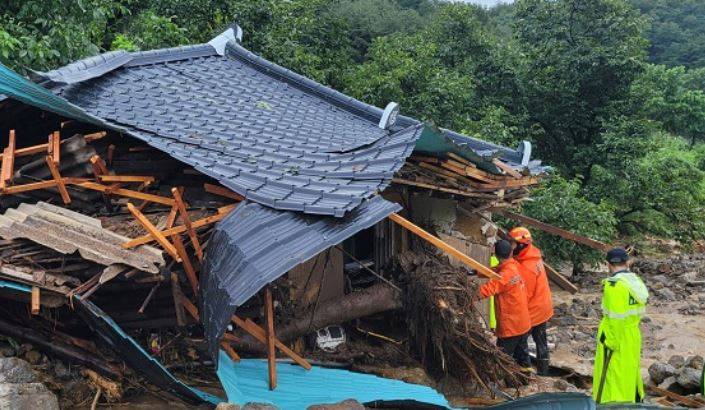South Korea is at the peak of its summer monsoon season, and there has been heavy rainfall for three days.
At least 22 people have died and 14 more are missing after heavy rain caused flooding and landslides in South Korea, officials said Saturday, with thousands more ordered to evacuate their homes.
South Korea is at the peak of its summer monsoon season. There has been heavy rainfall for the last three days, triggering widespread flooding and landslides and causing a major dam to overflow. The interior ministry reported that 22 people had been killed and another 14 were missing in the heavy downpours. They were mostly buried in landslides or after falling into a flooded reservoir.
The majority of the casualties—including 16 dead and nine missing—came from North Gyeongsang province. This is largely due to massive landslides in the mountainous area that engulfed houses with people inside. South Korea’s Yonhap News Agency reported 24 deaths, citing local disaster relief officials.

In the most severely affected areas, “entire houses were swept away whole”, one emergency responder told Yonhap. More than 6,400 residents in the central county of Goesan were ordered to evacuate early Saturday as the Goesan Dam began overflowing and submerging low-lying villages nearby, the interior ministry said.
Some of the missing people were swept away when a river overflowed in North Gyeongsang Province, the ministry said. Rescue workers were battling to reach 19 cars trapped in an underground tunnel in Cheongju, North Chungcheong Province. One person was found dead, according to Yonhap.
Flash flooding swept through the area too quickly for people to escape. However, water levels remain high, and it is unclear how many people were trapped inside their vehicles, Yonhap reported.
The number of deaths is expected to rise as local government agencies assess damage nationwide, the news agency said. All regular train services nationwide were suspended as of 2 p.m. (0500 GMT), although KTX high-speed trains remained operational with potential schedule adjustments, according to the Korea Railroad Corporation.

A number of roads and trails in national parks were closed due to rain and flooding. The Korea Meteorological Administration issued heavy rain warnings, saying more rain was forecast until Wednesday next week. It said the weather conditions pose a “grave” danger.
South Korean Prime Minister Han Duck-soo urged officials to prevent river overflows and landslides and requested support for rescue operations from the defense ministry.
Source: Channeltv




No comments yet
Be the first to share your thoughts!